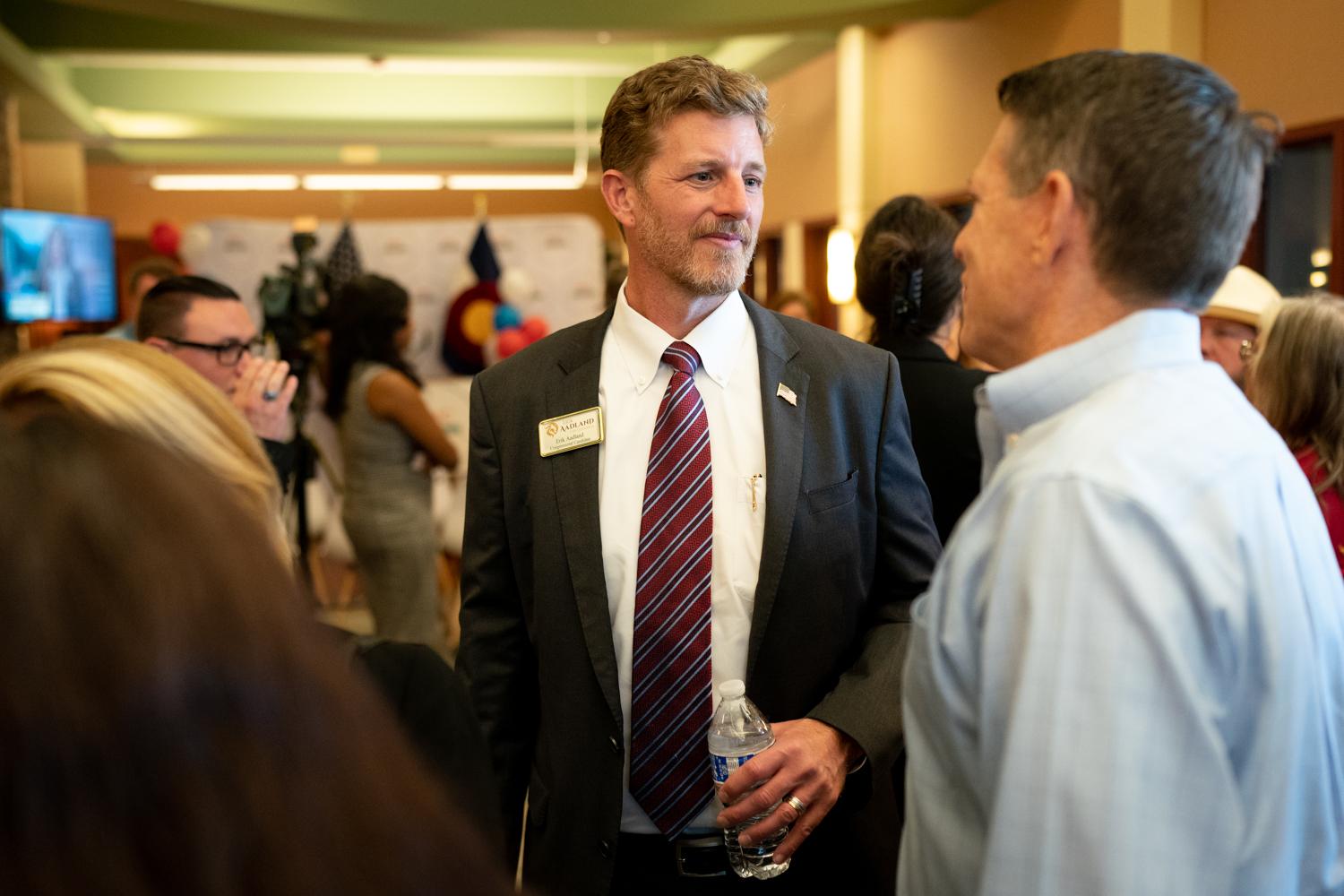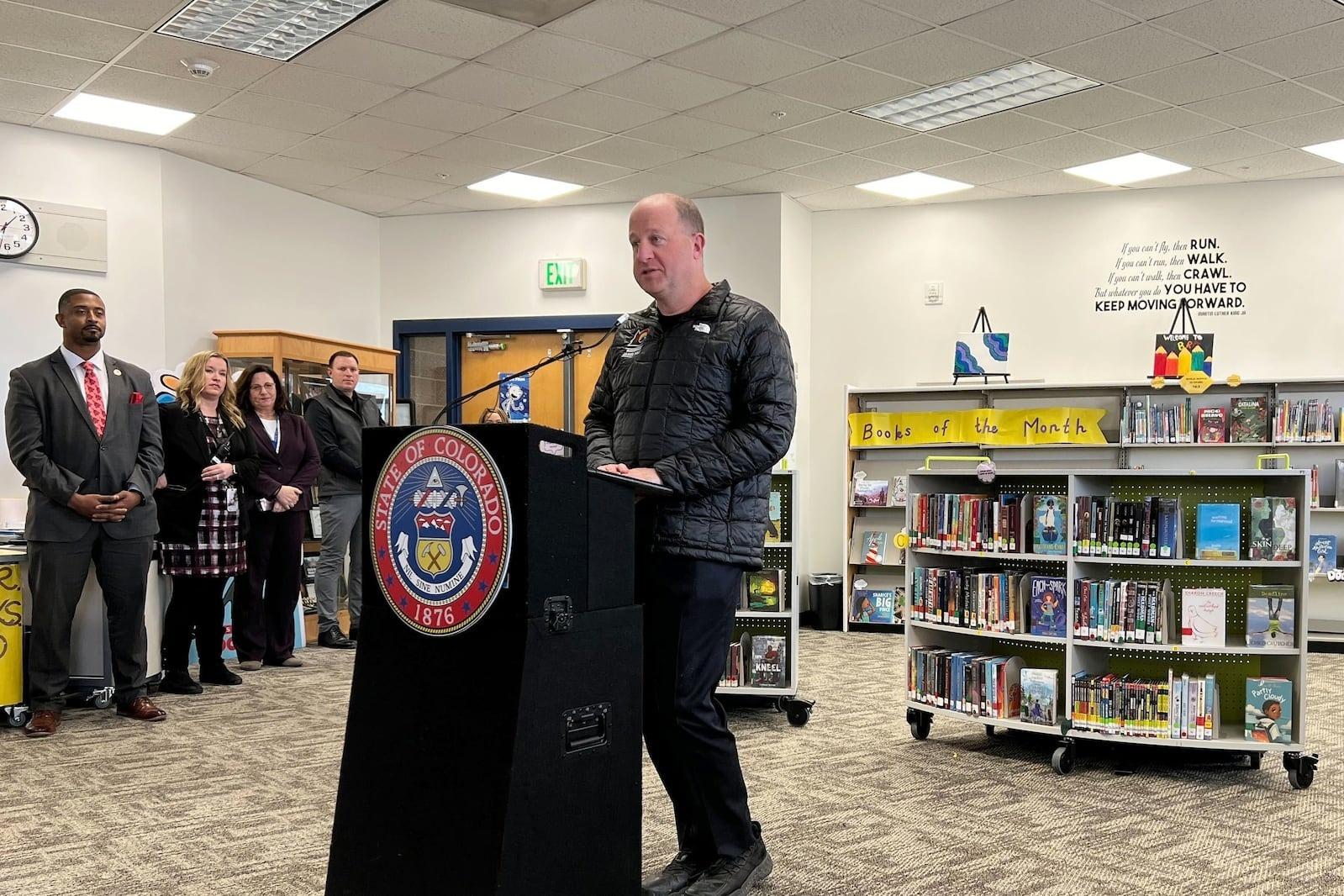
For Colorado's Future, an independent spending committee supporting Colorado congressional candidate Erik Aadland, may have received an illegal donation from a company doing business with the federal government. It has also spent hundreds of thousands of dollars more than it has collected, leaving significant sums of money unaccounted for, according to campaign finance records.
Aadland is the Republican candidate in the 7th Congressional district, where he faces off against Democrat Brittany Pettersen.
Both candidates have benefited from hundreds of thousands of dollars of outside support from super PACs, including some from “dark money” groups for Pettersen. But campaign finance experts said that For Colorado’s Future fundraising and spending for Aadland may have violated campaign finance law.
A Colorado company, Pericle Communications, gave about $25,000 to For Colorado’s Future. Public records show Pericle works on projects for the federal government, and federal contractors are banned from spending money on federal elections.
“This is a prohibition that has been around for decades. The basic idea is that if you’re a federal contractor and you are benefiting from taxpayer-funded contracts, then … it’s either actually corruption or creates the appearance of corruption for you to be able to make political contributions,” said Saurav Ghosh, director for federal reform at Campaign Legal Center, a nonprofit government watchdog.
Pericle is based in Colorado Springs and is an engineering firm specializing in wireless communications. Colorado Public Radio is listed as a customer on Pericle’s website. The company performed a radiation study on one of CPR’s tower sites in 2018, but there is no current contract.
The company has taken on numerous federal contracts with the Department of Defense and the Commerce Department since 2007, according to the Federal Procurement Data System. Most recently, Pericle has been working on a National Institute of Standards and Technology contract worth a total of $1.2 million, records show.
Representatives for the company didn’t respond to messages left via email and phone requesting comment, nor did representatives for the super PAC.
There are few if any exceptions that would allow a contractor to make such a donation. “If it’s a company that has a federal contract and it’s making a contribution, that’s black-and-white,” Ghosh said.
Pericle’s NIST contract was in effect at the time of the donation on June 24, according to federal records. The latest purchase order had been signed on April 8, with a completion date of Aug. 31. The ban on donations extends until “the contractor completes performance of the contract,” according to the law firm Akin Gump Strauss Hauer & Feld.
Brett Kappel, an elections attorney with Harmon, Curran, Spielberg & Eisenberg, agreed that the donation might not be allowed, writing in an email that a company making a donation while a federal contract is open would be “especially problematic.
The FEC has penalized other federal contractors for donating to super PACs recently.
Marathon Petroleum Company LP was dinged for making contributions totaling $1 million to independent spending groups in the 2020 election cycle. Marathon’s lawyers said the company made an “inadvertent oversight,” since it held only a single federal contract at the time. The company ultimately agreed to pay an $85,000 penalty.
It’s unclear if the donation from Pericle would catch the attention of the FEC, Ghosh said. The $25,000 sum might be small enough, he wrote, that the FEC “could simply require the contribution to be refunded.”
But in some cases, companies making similar small donations have faced penalties. Federal contractor TonerQuest was fined $4,700 this year after it gave a $25,000 donation to a super PAC, Insider reported.
Other elements of the spending reports from For Colorado’s Future also raise questions, Ghosh said after reviewing its campaign finance filings.
As of June 30, the last day for which complete data is available, the super PAC has taken in a total of $80,000 in donations, but it had spent $338,000 in support of Aadland in the primary election. The organization had not reported taking out any loans, so it’s unclear where the extra $250,000-plus came from. The committee has spent tens of thousands more since then, according to its interim financial reports.
“The receipts just don’t explain how they’re paying for the independent expenditures that they’ve made … It just doesn’t really add up,” Ghosh said. “Voters have a right to know who is spending on elections, and when a committee fails to provide complete and accurate transparency of what they’re receiving and what they’re spending on, they’re denying voters their right, and essentially pulling the wool over their eyes.”
In some cases, the FEC might fine a committee for failing to report contributions and loans. The typical penalty might be about a quarter of the un-reported funds, Ghosh said.
For Colorado’s Future PAC has spent all $393,000 of its reported expenditures with Telephone Town Hall Meeting, based in Golden. The Aadland campaign also had spent about $37,000 with the company as of June 30, or about 8 percent of its total spending, which raised other questions for Ghosh.
Sharing a vendor would be illegal if the company is helping the campaign and the super PAC to coordinate their advertising. Campaigns and independent groups are not allowed to work together. But it can be legally OK for a vendor to work for both, he added, as long as there’s a “firewall” ensuring that the vendor isn’t helping the two groups coordinate.
Representatives for Telephone Town Hall Meeting didn’t respond to an email and phone call requesting comment on Monday.
Despite the legal questions, For Colorado’s Future spending is small compared with the tidal wave of outside funding that has washed over American politics, Ghosh said.
“With the amount of money pouring into our elections, increasing really every election cycle — the failure to report is problematic, but this really isn’t that much money,” Ghosh said, adding that he still wants to see groups held accountable.
Pettersen, the Democratic candidate in the race, also has received support from outside groups such as the Colorado Democratic Party, Fair Share Action, the House Majority PAC, and a PAC run by the Service Employees International Union.
Some of those groups conceal the source of their funds. For example, Fair Share Action has received nearly $2 million from the Sixteen Thirty Fund — a Democrat-aligned dark money group that allows donors to anonymously funnel money into politics.
Those kinds of anonymous donations are allowed under the nation’s election laws.









